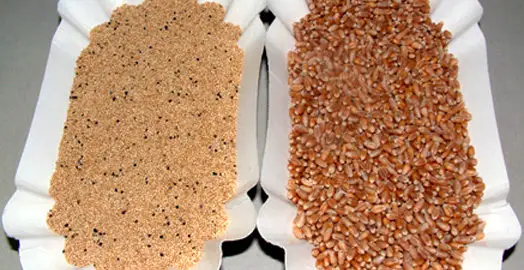Amaranth grain is isn’t technically a grain like oats, wheat, or rice. It is known as a super food and is known for being easily harvested. It has the following qualities;
- Its seeds are a good source of protein.
- In cooked and edible forms, amaranth retains adequate content of several dietary minerals.
- It is easy to cook.
- As befits its weedy life history, amaranth grains grow rapidly and, in three cultivated species of amaranth, their large seedheads can weigh up to 1 kg and contain a half-million small seeds (source)
So can guinea pigs eat amaranth at all?
Let’s take a look at its nutritional data and find out more.
In particular, its acidic, water, sugar, fat, salt, calcium, and phosphorus content is of most interest as far as guinea pigs are concerned.
Nutritional value per 100 g (3.5 oz)
Energy 1,554 kJ (371 kcal)
Carbohydrates
65.25 g
Starch 57.27 g
Sugars 1.69 g
Dietary fiber 6.7 g
Fat
7.02 g
Saturated 1.459 g
Monounsaturated 1.685 g
Polyunsaturated 2.778 g
Protein
13.56 g
Tryptophan 0.181 g
Threonine 0.558 g
Isoleucine 0.582 g
Leucine 0.879 g
Lysine 0.747 g
Methionine 0.226 g
Cystine 0.191 g
Phenylalanine 0.542 g
Tyrosine 0.329 g
Valine 0.679 g
Arginine 1.060 g
Histidine 0.389 g
Alanine 0.799 g
Aspartic acid 1.261 g
Glutamic acid 2.259 g
Glycine 1.636 g
Proline 0.698 g
Serine 1.148 g
Vitamins
Thiamine (B1) (10%) 0.116 mg
Riboflavin (B2) (17%) 0.2 mg
Niacin (B3) (6%) 0.923 mg
Pantothenic acid (B5) (29%) 1.457 mg
Vitamin B6 (45%) 0.591 mg
Folate (B9) (21%) 82 μg
Vitamin C (5%) 4.2 mg
Vitamin E (8%) 1.19 mg
Minerals
Calcium (16%) 159 mg
Iron (59%) 7.61 mg
Magnesium (70%) 248 mg
Manganese (159%) 3.333 mg
Phosphorus (80%) 557 mg
Potassium (11%) 508 mg
Sodium (0%) 4 mg
Zinc (30%) 2.87 mg
Other constituents
water 11.13 g
source wikipedia
Summary
As you can see Amaranth contains quite a lot of water, fat and calcium, a huge amount of phosphorus and acidic content plus a little sugar.
This means it is not the best food for guinea pigs to eat.
If they were to have a little nibble of it, they would be fine.
But due to its acidic and phosphorus content, it should not be eaten in large quantities and is a food to be avoided as far as guinea pigs are concerned.
There are much better foods for piggies to eat.
